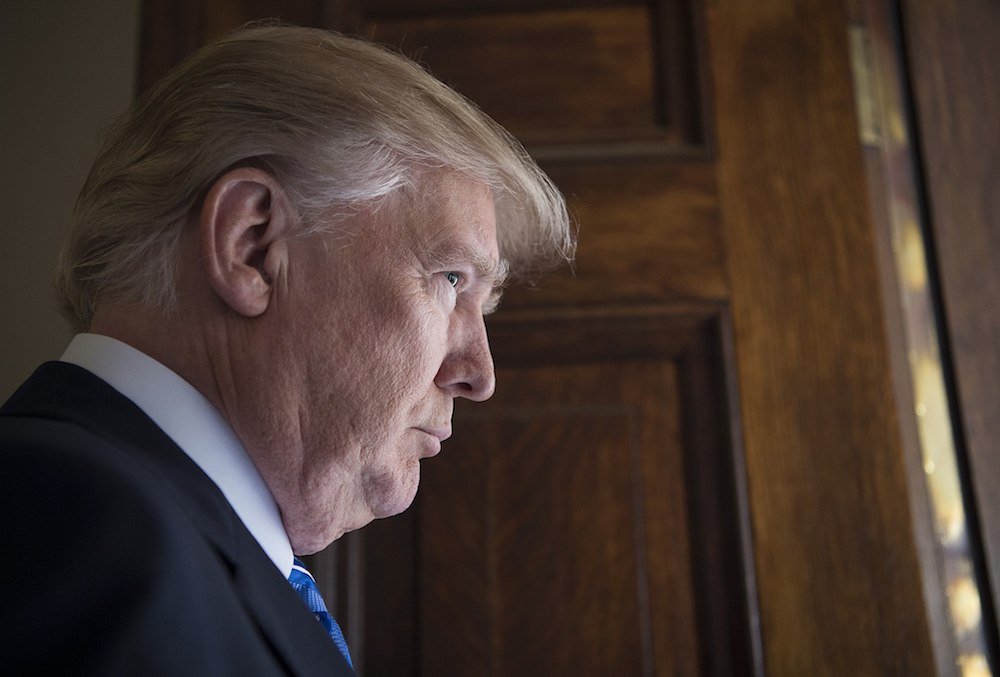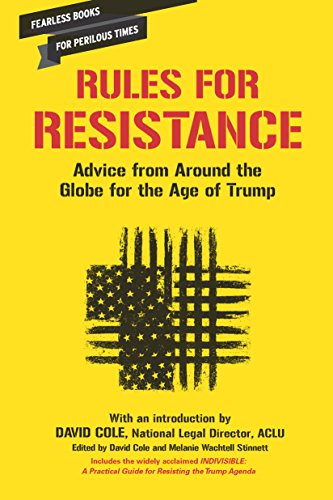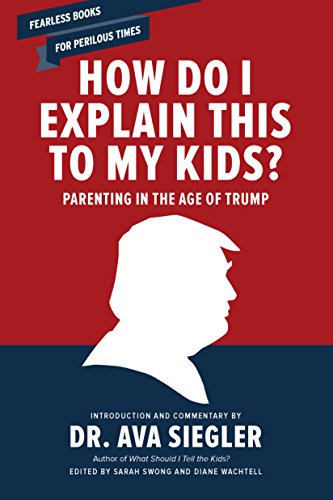Advice From Around the World in the Trump Age
Three books, including one by authors who have battled authoritarianism worldwide, address how to navigate our society of fear and judgment. President Trump in May 2017. (DOD photo by U.S. Air Force Tech. Sgt. Brigitte N. Brantley)
President Trump in May 2017. (DOD photo by U.S. Air Force Tech. Sgt. Brigitte N. Brantley)
“Radical Hope: Letters of Love and Dissent in Dangerous Times” A book edited by Carolina De Robertis
“Rules for Resistance: Advice From Around the Globe for the Age of Trump” A book edited by David Cole and Melanie Wachtell Stinnett
“How Do I Explain This to My Kids?: Parenting in the Age of Trump” A book edited by Sarah Swong and Diane Wachtell
You saw them. You probably read a few. Maybe you even wrote one.
Seething political takes. Overwrought open letters. Emotional manifestos. They began invading our inboxes and Facebook feeds in the early hours of Nov. 9, 2016, and continued for days and weeks. They frothed from keyboards across the country, countless renditions of what became an instantly recognizable genre: the How I Felt on Election Night essay.
The first one I recall was by New Yorker editor David Remnick, who proclaimed “revulsion and profound anxiety” at Donald Trump’s victory. But it was Aaron Sorkin, America’s leading purveyor of political self-righteousness, who typified the form in an open letter to his teenage daughter and former wife in which he pledged to “f—ing fight” Trump and reassured Americans that “our darkest days have always—always—been followed by our finest hours.”
The impulse to write and share such early thoughts, to grapple with a shocking and disorienting event, is understandable. Less understandable is the impulse to bind collections of such essays into anthologies that, months later, purport to show a path forward for Trump’s opponents. Yes, individual essays and open letters can inspire on occasion. Put dozens of them together, however, and their timeliness erodes, their echoes annoy, and their inadequacy as self-styled resistance manuals grows clear.
I don’t know how else to put this, but I no longer care how you felt on election night. Not anymore.
Two recent collections, “Radical Hope” and “How Do I Explain This to My Kids?,” featuring dozens of essays by artists, novelists, journalists and activists, reveal the limits of the approach. A third, “Rules for Resistance,” with contributors who have battled or chronicled authoritarianism worldwide, displays emotion sobered by experience, providing a more resonant and practical read six months into the Trump presidency.
“Overwhelmed by grief.” “Brokenhearted.” “Hopeless.” “Something inside me died on Election night.” “I woke up that morning and everything felt f—ed.”
That’s how several contributors describe their immediate feelings about Trump’s triumph. But the most common response is even more visceral: fear.
“I am not ashamed to admit I am more afraid than ever,” writes novelist Meredith Russo. For novelist Mira Jacob, the moment evoked the attacks of Sept. 11, 2001: “At four [a.m.], I bolted awake with a surge of fear I have not felt for fifteen years.” And writer Nicole Chung recalls how, that evening, she and her husband “would remain up for hours, alternately swearing and reaching for each other’s hands in bleary and increasing panic.”
Stanford University scholar Jeff Chang emphasizes how Trump capitalizes on such emotions—”fear is the lubricant of demagoguery,” he says—but in their introductions to “Radical Hope,” Pulitzer winner Junot Diaz and editor Carolina De Robertis stress that fear can propel more constructive reactions. “We need to connect courageously with the rejection, the fear, the vulnerability that Trump’s victory has inflicted on us,” Diaz writes. Once the shock settles, “faith and energy will return,” he assures.
“We can either silence ourselves and live in fear, or we can stand even taller and speak,” De Robertis explains. “Dissent is verbal resistance.”
Click here to read long excerpts from “Radical Hope” at Google Books.
As fear passes, some hope does emanate from the pages of “Radical Hope.” Writer Parnaz Foroutan addresses women who are immigrants, exiles and refugees in America, urging them to “pay no heed to the darkness, the open mouth of greed, the hateful speech, the walls and the guns. … America is yours.”
But fear also morphs into anger and judgment, including toward Trump voters. “F— being nice and polite,” writes Egyptian feminist Mona Eltahawy. “These are not nice or polite times. Be angry. Be loud. And be free!” Poet Mohja Kahf breaks down Trump’s support, concluding wryly that “hey, really only about one-fourth of the country hates us and/or hates Black people, LGBTQ folk, Latinx peoples, Indigenous peoples, and immigrants. And we already knew that, right?”
Even some of the contributors seeking to reach out to Trump’s base—at least in a think-piecey, theoretical sense—find ways to demean. “Despite months of looking, I never managed to meet a liberal New Yorker who thought of Trump supporters as anything other than an undifferentiated bloc of subhuman troglodytes,” writes Princeton University lecturer Boris Fishman, a statement that might say less about New York City than about this particular writer’s acquaintances. He urges “fellow liberals” to talk to people who are “nothing like us—politically,” though he is quick to add a qualification.
“Not the bigots,” he explains.
It’s precisely those distinctions that the writers of “Rules for Resistance” warn against, no matter how strong the compulsion to condescend or justifiable the eagerness to blame.
Dismissing Trump voters as racists is an “idiotic simplification of extremely complex human beings,” writes Satyen K. Bordoloi, a Mumbai filmmaker. “We in India have been doing the same thing for two and a half years, and the results have been devastating. Our society has fractured much more because of these blanket accusations. Those who voted for [Prime Minister] Narendra Modi have gone into their defensive shells after such accusations and became more protective of their leader as their very sense of self became attached to him.”
Click here to read long excerpts from “Rules for Resistance” at Google Books.
In Venezuela, the opposition to the late Hugo Chávez made similar mistakes. “We wouldn’t stop pontificating about how stupid Chavismo was, not only to international friends but also to Chavez’s electoral base,” journalist Andrés Miguel Rondón explains. “‘Really, this guy? Are you nuts? You must be nuts,’ we’d say.” As a result, “whole generations were split in two [and] a sense of shared culture was wiped out.”
Rondón’s appeal to American readers is simple: “This does not have to be your fate. … Recognize that you’re the enemy Trump requires. Show concern, not contempt, for the wounds of those who brought him to power.”
Of course, the United States is not India and certainly not Venezuela. But the writers in “Rules for Resistance” are wary of excessive faith in U.S. democratic institutions. “It is precisely such overconfidence in the United States’ long and illustrious tradition of liberty that could lull the American public into a false sense of security and facilitate the rapid destruction of that very tradition,” writes Turkish political scientist N. Turkuler Isiksel. Don’t obsess over particular legislative agenda items the Trump administration promotes, she says; focus instead on the democratic norms it undermines. “What we therefore have to prepare to resist is not policy change; it is regime change.”
The essays in “Rules for Resistance” were originally published in newspapers and journals in late 2016 or early 2017 (a version of Rondón’s article appeared in The Washington Post), but their warnings and predictions remain apropos. Chaotic leadership, for instance, does not mean it’s powerless. “Populists govern by swapping issues, as opposed to resolving them,” writes Hungarian author Miklós Haraszti. “Purposeful randomness, constant ambush, relentless slaloming, and red herrings dropped all around are the new normal.” Also, opposing leaders based on their odious personal traits may feel satisfying but can be self-defeating. “An opposition focused on personality would crown Trump as the people’s leader of the fight against the Washington caste,” writes business professor Luigi Zingales, who draws persuasive parallels between Trump and Italy’s Silvio Berlusconi.
Beware, too, of simply waiting for disillusioned Trump supporters to turn against him. “There will come a time, and it won’t be long, when the followers of Orange Caesar will realize that they have been lied to,” writes novelist and “Radical Hope” contributor Luis Alberto Urrea. But that doesn’t mean they’ll reject Trump just because he fails to deliver on the border wall or manufacturing jobs—as long as he gives them someone else to blame.
“The danger … is that his efforts to fulfill these promises will prove good enough,” writes scholar Bernard Avishai. For him, the Trump era is not merely a “four-year, reversible anomaly” but the beginning of a long struggle.
And that struggle, according to “How Do I Explain This to My Kids?,” is generational. “We must shield our children from the effects of Trump’s policies as best we can and protect them from the worst aspects of his character,” clinical psychologist Ava Siegler writes in the volume’s introduction. “But we must also try to explain to them how someone like this could have been elected to the highest office in the land. … And we must include them in our resistance.”
Click here to read long excerpts from “How Do I Explain This to My Kids?” at Google Books.
An overriding debate in this collection is over how forthright to be with children about the president’s proclivities and prejudices. “We’ve tried throughout this campaign to be honest with our kids about our hopes and dreams,” writes Slate’s Dan Kois, “but tonight, on election night, I realized I never really found a way to be honest with them about our fears.” For UCLA historian Robin D.G. Kelley, honesty is less about the president than the nation. “How do we teach our children our history—in the United States and the world?” he asks. “They are taught to cherish equality, to disdain inequality, but never how inequality is produced.”
One parent even suggests that he might stop teaching honesty as a value. “As much as it pains me to admit,” writes filmmaker John Ziegler, “it is now clear that in order to best prepare my children for life in this new ‘post-truth’ era of America, they need to be educated that a well-executed lie will beat an unpopular truth every single time.”
What so many of the How I Felt on Election Night pieces share is not just emotion but certainty. Certainty about what Trump means, who supports him, the dangers he poses—and how to respond.
And that is why there’s one essay in “Radical Hope” I’ll remember most. In a letter to her child, novelist Katie Kitamura abhors the torrent of voices and views that Trump’s election has unleashed, and warns of the “terrifying rapidity” with which words—whether they aim to assault or resist—can unmake the world. “We need to defend another way of thinking and being, one that allows for hesitation, for nuance and mutability,” she writes. “I have a distrust of certitude, even when I agree with the essential position being advocated. I don’t think the urgency of our situation means that we cannot afford uncertainty. I need to believe in the value of the doubt I now feel. … I need to believe in it, not least because it promotes thinking before acting.”
She wants her child to know a world where language is not impoverished, not made to serve easy absolutes. “I worry that you will grow up in a time of ideological haste, a time of wild conviction and coarsened thought,” she writes. It is a fate that should also elicit revulsion and profound anxiety. It is a fate we should resist.
Carlos Lozada is associate editor and nonfiction book critic of The Washington Post.
©2017 Washington Post Book World
Your support matters…Independent journalism is under threat and overshadowed by heavily funded mainstream media.
You can help level the playing field. Become a member.
Your tax-deductible contribution keeps us digging beneath the headlines to give you thought-provoking, investigative reporting and analysis that unearths what's really happening- without compromise.
Give today to support our courageous, independent journalists.









You need to be a supporter to comment.
There are currently no responses to this article.
Be the first to respond.